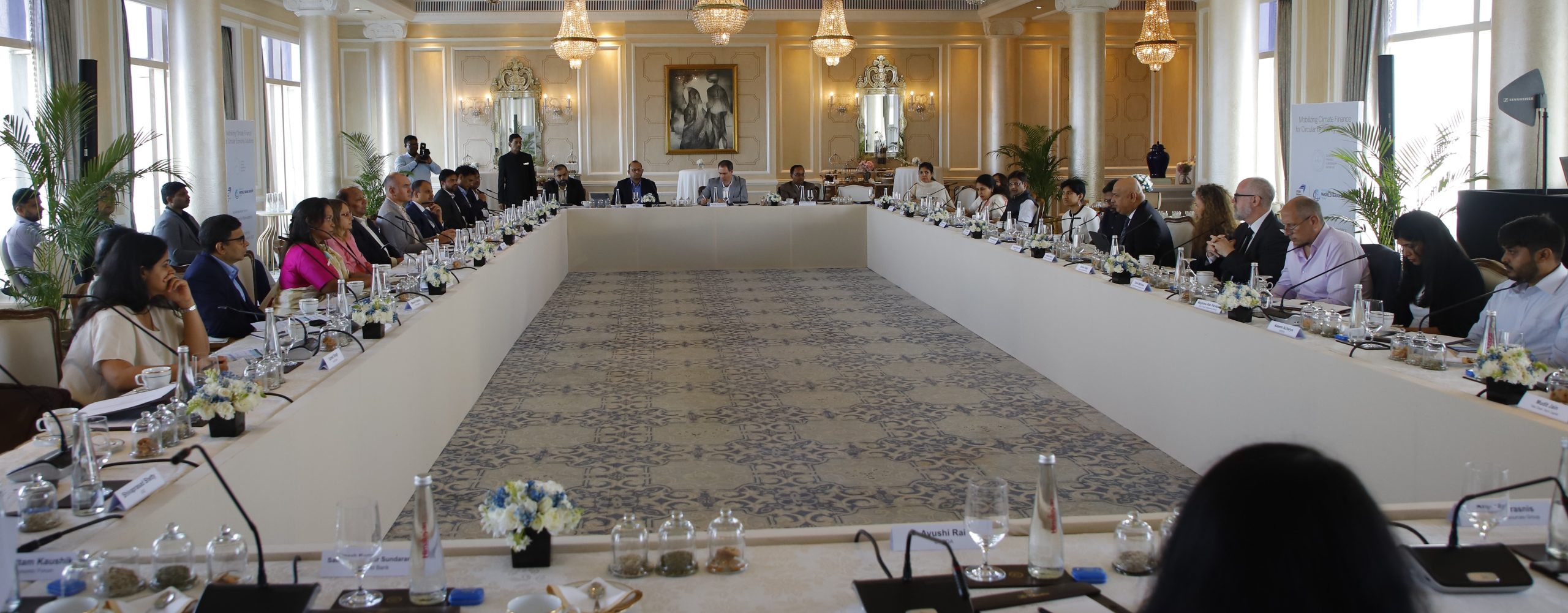Successful Roundtable on Mobilizing Climate Finance for Circular Economy Solutions

Mumbai, 29 May 2023 – The roundtable on Mobilizing Climate Finance for Circular Economy Solutions, hosted jointly by the 2030 Water Resources Group (2030 WRG) multi-donor trust fund, Climate Finance Leadership Initiative (CFLI) India and GIZ with the Government of Maharashtra, was a resounding success. The event brought together government officials, industry leaders, development finance organizations, and policy think tanks to discuss innovative financing and policy interventions for promoting the safe reuse of treated water in urban and industrial clusters.
Sudhakar Deshmukh, Commissioner for the Ichalkaranji Municipal Corporation, Government of Maharashtra, India elaborated: “We need to create an enabling environment through policy initiatives including an incentive-disincentive framework which can help create a market and buyers for treated water.”
Mr. Achim Fabig, Consul General for the German Consulate in Mumbai said: “Reduction in water footprint to combat climate change is one of the key priority areas in the agriculture and textile sectors for GIZ’s project on Sustainability and Value Added in Agricultural Supply Chains. Germany is committed to expanding and deepening our long-standing development cooperation with India on this and many sectors.”
“The World Bank is committed to supporting programmatic interventions in scalable models of wastewater reuse through credit enhancement models which can help crowd in more private finance. We need to Act Fast to prevent Day Zero,” said World Bank Water Global Director Saroj Kumar Jha.
Accelerating the transition
During the roundtable, fruitful discussions took place regarding the financing challenges and opportunities associated with wastewater treatment and reuse. The participants explored innovative financing models, public-private partnerships, and policy reforms necessary to accelerate the transition towards a low carbon circular water economy.
The event highlighted the importance of collaboration between the private sector, government bodies, and development finance institutions to mobilize climate finance for wastewater projects. The Climate Finance Leadership Initiative (CFLI)[1] India has been actively engaging the private sector in these efforts, while institutions like the International Finance Corporation (IFC) have provided crucial financing for wastewater infrastructure projects.
“AWS is well on the path to becoming water+ and as part of this new commitment will report annually on water reuse and recycling efforts, new activities to reduce water consumption in its facilities, and advancements in new and existing replenishment projects. We are happy to partner with the government and private sector in these efforts,” said Ken Haig, Head, Energy and Environmental Policy, APAC, Amazon Web Services (AWS).
[1] The Climate Finance Leadership Initiative (CFLI) was launched in 2018 by Michael R. Bloomberg at the request of the UN Secretary-General to mobilize private finance for climate action. CFLI India, announced at the India-UK Economic and Financial Dialogue in 2021, aims to mobilize investment, strengthen local environments, and facilitate private capital at scale. Co-chaired by N. Chandrasekaran and Shemara Wikramanayake, CFLI India includes leading institutions like Tata Sons, Macquarie Group, Goldman Sachs India, and more. CFLI India focuses on ‘Investing in a Circular Economy.’
Potential for Water Reuse Investments
A significant outcome of the roundtable was the identification of opportunities to implement wastewater reuse projects in select municipal corporations and urban local bodies in Maharashtra. Additionally, participants discussed the potential for water reuse investments and certificates in textile clusters, emphasizing the importance of circular economy principles.
“We will need to move performance-linked incentives and alternate funding models to scale wastewater reuse in the Textiles Sector and adopt a preventive rather than curative approach to strengthen the Sustainability framework in the Textile value chain across fibers,” shared Roop Rashi, Textiles Commissioner, Government of India.
Dr. Sanjay Chahande, Chairman for the Maharashtra Water Resources Regulatory Authority (MWRRA), said: “Wastewater reuse certificates and trading is a reformist idea and offers a market-based mechanism for fostering equity and sustainability in the water sector”
Jameela Pedicini, Lead for the Climate Finance Leadership Initiative (CFLI), concluded: “Along with 2030 WRG and our partners, we look forward to co-developing tangible, near term next steps including financial models for scalable projects in wastewater treatment and reuse in Maharashtra and other states in India.”
The roundtable served as a platform for knowledge sharing and the formulation of actionable recommendations. By leveraging the expertise and resources of all stakeholders involved, the event paved the way for future collaborations and initiatives aimed at achieving a sustainable and water-secure future.
